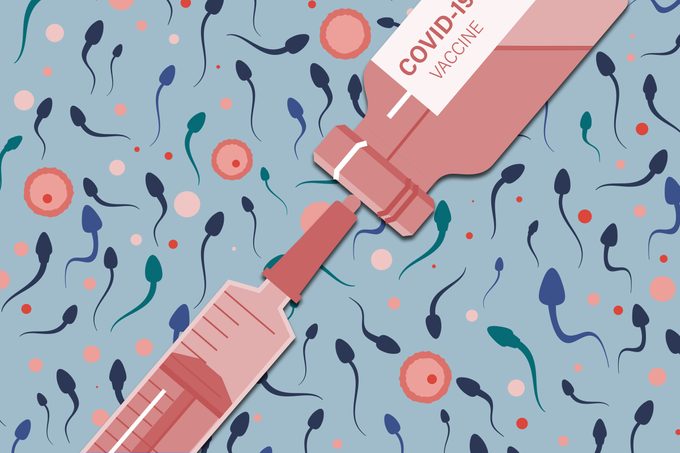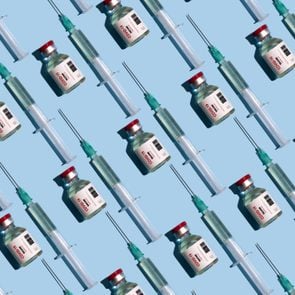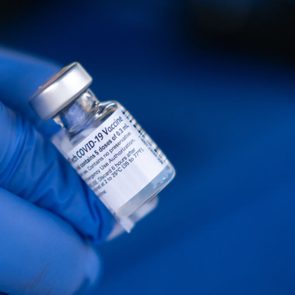Do the Covid-19 Vaccines Cause Infertility? Here’s What Doctors Say
Updated: Mar. 30, 2022
Myths are swirling that the Covid-19 vaccines may cause infertility or pregnancy problems. Find out why you don't have to worry.
Covid-19 vaccines and infertility
Even with 330 million Covid-19 shots in arms and 114 million people fully and safely vaccinated, many folks are still hesitant to get a jab. Among the reasons? Misinformation on social media and elsewhere that the vaccine may cause infertility or bad pregnancy outcomes.
Three major medical organizations say there’s no evidence to back this up, including the American College of Obstetricians and Gynecologists (ACOG). Along with the Centers for Disease Control and Prevention (CDC), they stress that vaccines are safe.
Despite the experts all agreeing that the vaccine is safe for women who are pregnant or wanting to get pregnant, people still have questions. Here’s what you need to know about Covid-19 vaccines and infertility.
How the rumor started
Last December, a German epidemiologist remarked that the genetic code of the spike protein in SARS-CoV-2, the virus that causes Covid-19, was similar to one found in a woman’s placenta. The placenta is an organ that develops during pregnancy and helps nourish the growing baby.
Because the three vaccines available in the United States all target the spike protein, the scientist concluded that the vaccine would also damage the placenta. The evidence does not bear this out.
Although there is a small segment of DNA that’s similar between the spike protein and the placenta protein, it’s too small to be of any consequence, explains Joseph Biggio, MD, system chair of Women’s Services and Maternal-Fetal Medicine at Ochsner Health System in New Orleans.
“When you look at the proteins themselves, it doesn’t pan out,” he says.
And any woman who has a placenta is already pregnant and therefore not infertile.
“It simply does not make sense and is not held up to be true,” says Raminder Khangura, MD, a maternal-fetal medicine specialist at Henry Ford Health System in Detroit.
(Infertility isn’t the only Covid-19 vaccine myth you can safely dismiss.)
Clinical trials and pregnant women
Clinical trials, including Covid-19 vaccine trials, typically don’t include pregnant women.
Officially, then, there’s only limited information on how the vaccines affect pregnant women. That means the CDC has not recommended outright that pregnant women get the vaccine. They stress that vaccines are safe, however, and are certainly not discouraging women from getting the vaccine.
The United Kingdom follows a similar line—making the Covid-19 vaccines available for pregnant women without explicitly recommending that they get one.

Women have gotten pregnant after the vaccine
In fact, 23 women conceived during the Pfizer-BioNTech trial alone, 12 of them in the vaccine group. Dr. Khangura says she has personally cared for patients who received the vaccine and then got pregnant, many of them are healthcare providers.
Women have also gone on to have healthy babies, and the CDC continues to track vaccinated women before and during pregnancy through the v-safe Covid-19 Vaccine Pregnancy Registry.
So far, more than 106,000 women have signed up, and an April 21 analysis in the New England Journal of Medicine of almost 36,000 pregnant women in the registry found no difference in their pregnancy outcomes versus those of a general population.
“There don’t seem to be any signs or signals with early pregnancy loss or fetal anomalies,” says Dr. Biggio.
(Here’s what pregnancy during the coronavirus pandemic is like.)
Other vaccine side effects
Out of the millions of doses of vaccine administered, a handful of people have had serious reactions to the vaccines. The only common side effects are very mild and go away—and this seems to be true for pregnant women, too.
“The numbers and types of side effects do not differ from the general population,” says Dr. Biggio.
A mild fever is one possible side effect of the vaccine, and fevers can be dangerous in pregnant women.
“Every woman worries about fever in the first trimester, but the reality is that the fever associated with the vaccine is mild, it’s transient, and it’s certainly much lower than the fever you would get with an actual infection,” says Dr. Biggio. And an over-the-counter pill like acetaminophen (Tylenol) could suppress even low temperatures.
(Learn why women may report more Covid-19 vaccine side effects than men.)
None of the vaccines use live viruses
There is concern amongst some that the vaccines aren’t safe because of their quick development. Without question, they were quickly developed—but no safety steps were skipped.
And even though these exact vaccines did not exist before 2020, the technology they depend upon has been around for quite a while. The messenger RNA (mRNA) used by the Pfizer-BioNTech and Moderna vaccines has been in development for some 30 years. Johnson and Johnson uses an inactivated adenovirus to trigger antibodies, similar to vaccines for Ebola.
Most importantly, none of the three vaccines available in the United States include any live virus (the only type of vaccine pregnant women should avoid).
“When you look at the evidence of vaccines that have been used over the last several decades, anything that involves inactivated virus or just portions of the virus has not been associated with any types of problem,” says Dr. Biggio.
The CDC even recommends that pregnant women get the annual inactivated flu vaccine and the Tdap (tetanus, diphtheria, pertussis) vaccines.
Covid-19 vaccines and menstruation
Some women have reported changes in their periods after getting vaccinated, but Dr. Khangura says there’s not enough information yet to link irregular periods to vaccines.
This may even be hard to do, given that there are so many reasons your period could be “off.” Even worrying about the vaccine can mess things up, says Dr. Biggio.
The vaccines and breastfeeding
Vaccine trials also excluded women who were breastfeeding. So again, we just don’t know that much about the effects on mother or baby.
However, there’s no physiological reason why Covid-19 vaccines would be a risk. In fact, there may even be a benefit as antibodies may pass through the mother’s milk to help protect the baby against Covid-19.
Pregnancy and Covid-19
While scientists have no reason to believe Covid-19 vaccines are unsafe for women who are pregnant or planning to become pregnant, being sick with Covid-19 does pose a danger.
Women who are pregnant and contract Covid-19 are more likely to end up in the hospital, the ICU, and are more likely to die than women who aren’t pregnant.
Preliminary research also indicates that women who have severe Covid-19 have a higher chance of needing a C-section, hemorrhaging after giving birth, birthing preterm babies, and suffering hypertension.
In fact, the CDC lists pregnancy as a condition that puts you at higher risk for severe disease along with being elderly or obese, or having a medical condition like diabetes or lung disease.
“We know what the risks of infection with the virus are, and they can be severe, and they are far worse with anything we know might be associated with the vaccine so far,” says Dr. Biggio.
Deciding whether or not to get the vaccine
Ultimately, the choice to get a vaccine (or not) is yours. It’s a good idea to talk to your doctor about the pros and cons. And the CDC suggests considering these factors:
- The likelihood of infection
- If you have any other conditions that could make your disease more severe
- The benefits of vaccination
- Increasing evidence about the vaccines’ safety
- The best timing for getting a shot
“We have to weigh in people’s own personal views, but we as providers caring for pregnant women strongly encourage them to get the vaccine,” says Dr. Biggio. “We haven’t seen any ill effects from the vaccine.”
Next, check out the normal side effects of the Covid-19 vaccine.



